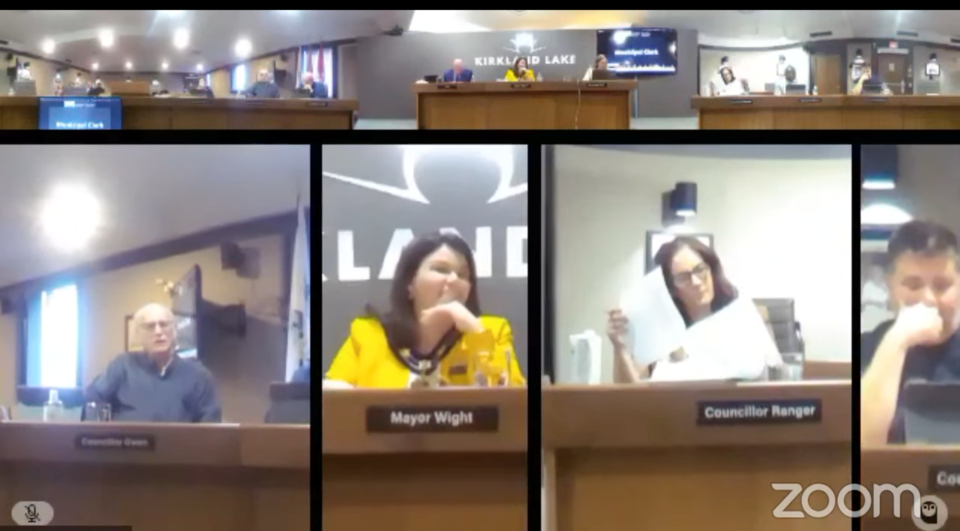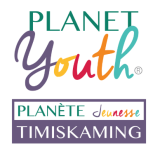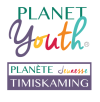Planet Youth introduced to Kirkland Lake council.

Kirkland Lake council met on April 25 for a special council meeting.
To view the Planet Youth discussion, start at 26:24.
KIRKLAND LAKE – Drawing from his own experiences, a councillor is shedding light on a pilot project aimed at helping young adults steer clear of tobacco, drug and alcohol challenges.
Planet Youth is a five-year pilot project to reduce tobacco, drug and alcohol use in young adults. Kirkland Lake Coun. Rick Owen, who has lived experience in both mental health and addiction issues, is hoping the program can help youth avoid what he experienced firsthand.
“If it costs us a little bit of money from the municipality, I’m more than willing to help, because if I can save one kid from going through everything I went through, then I’ll be very happy,” he said.
At the April 25 council meeting, director of community services Bonnie Sackrider introduced the program. No decisions or financial commitments were made on the item.
She said it’s based on an Icelandic prevention model and hones in on Grade 10 and Grade 11 students.
“It looks at the root causes in the community and talks a lot about protective and risk factors. Protective factors are things like your relationships with your family and your friends, school activities that you’re involved in, things that really protect the youth and make them more resilient,” she said.
“Risk factors are pretty straightforward; age of the first drink, if you smoke, if you vape, if you bring your phone in the bedroom with you at night and you scroll way too late into the night and have less sleep hours.”
In 1977, Iceland had a 42 per cent youth substance use rate. By 2022, it was down to five per cent. Several communities across Canada are now using Iceland’s model, Sackrider said, adding that Iceland has shared a number of strategies with those working on the Planet Youth initiative.
The program is being run by the Timiskaming Health Unit. Kirkland Lake is part of the project’s north coalition.
In the fall, surveys were completed by 561 students in Grade 10 and Grade 11.
“It’s not going to pit one school and centre. That’s not the intent. The intent is, here’s your data from Timiskaming, here’s your data from north, south, and central to see if there’s differences. And there are differences,” she said.
“These local action coalitions or committees are now going to brainstorm ideas. How do we get the data out there. And once the data is out there, how do we get teams of people to work together to figure out what to do with the data.”
One suggestion from Iceland was to allow youth to participate in activities for free.
“We don’t know if they got a government grant, had sponsors, those types of things, but basically, each student has a little card. So, you could do $300 worth of activities per year, whether you were going to take a dance class or join a club, but something to do that provides youth with an opportunity for an outlet,” she said.
“There’s a lot of ideas out there and the next step is to figure out what will work in Kirkland Lake. In the next little while, we’re going to be doing some community goal-setting workshops and coming up with evidence-based and community-informed solutions.”
Coun. Casey Owens, who’s been a teacher for about 20 years, said he’s had a front-row seat to this change in generation.
“From where I started my career to where I’m at now, the change in our youth, it’s incredible, and not a good incredible. It’s scary as to what’s going on and what some of these kids are going through and how well they hide it. So this is a great tool we have on our hands to be able to try and change this,” he said.
He added it’s going to take efforts from youth, their parents and the community as a whole.
Mayor Stacy Wight said the program is a very different approach to what they’ve seen in the past.
“Normally, when we think of addictions and problems with our youth, we see the kids drowning and we’re trying to help them not drown. This idea here is to get them before they even get into that river,” she said.
“I really think this program, because it’s really localized both in the data that is collected and the solutions, it’s really unique and something that we can all get behind.”
Sackrider said she’s very passionate about the initiative. “What we’re doing can make a difference in the lives of our youth, and the youth are our future. If our youth become healthier and happier, we’re going to have a much more successful Kirkland Lake than if we don’t work at this,” she said.
Owen said perhaps when he was young and involved in sports, if a program like Planet Youth had been available to him, his life might have been different.
“I think that’s one of the problems that hopefully this program can address, because a number of sports and alcohol ride together. It’s a cultural thing. My two big sports were football and hockey, and both of those were very tight in with drinking,” he said.
However, Owen said a quick change shouldn’t be expected.
“It’s a cultural change that has to happen. And I’m very pleased to see that we’re not sitting on our thumbs saying our youth are no good. Well, no, maybe they just need a little help,” he said.
“There’s one thing that this program can’t do anything about and that’s the genetic portion of addiction and mental health. But if this program can improve the environment around which the young people are involved, that could really help. So, go full force.”
Marissa Lentz, Local Journalism Initiative Reporter
Article Source

